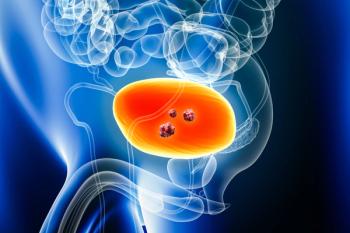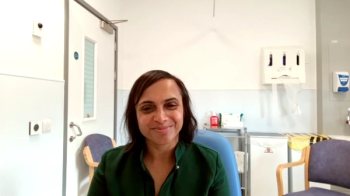
Enfortumab vedotin showed a robust disease control rate in patients with urothelial cancer outside of a clinical trial, and its efficacy was not inferior in patients with diabetes and/or neuropathy.

Enfortumab vedotin showed a robust disease control rate in patients with urothelial cancer outside of a clinical trial, and its efficacy was not inferior in patients with diabetes and/or neuropathy.

Sheela Rao, MBBS, FRCP, MD, consultant medical oncologist at the Royal Marsden Hospital, discussed the findings of the POD1UM-303/InterAACT2 trial of retifanlimab plus chemotherapy for squamous cell carcinoma of the anal canal (SCAC).

Jonathan Riess, MD, MS, director of thoracic medicine at UC Davis Health, gave insight into the rationale and efficacy data for combining cancer vaccine IO102-IO103 with pembrolizumab in advanced squamous cell carcinoma of the head and neck.

Deepened, persistent responses were seen in the long term among patients with advanced melanoma treated with fianlimab and cemiplimab, Meredith McKean, MD, MPH, director of melanoma and skin cancer research for Sarah Cannon Research Institute, explained.

Using real-world data, researchers compared 2 chimeric antigen receptor (CAR) T-cell therapies with a bispecific antibody, teclistamab, in multiple myeloma (MM).

Trastuzumab deruxtecan (T-DXd) was effective in patients with HER2-positive (HER2+) metastatic breast cancer, with no new safety profiles observed.

Disparities continue in younger patients, raising the need for novel interventions to mitigate challenges associated with younger age at diagnosis.

During ESMO Congress 2024, sessions will focus on hot topics in therapeutic areas, such as antibody-drug conjugates; the latest trial data; health policy; and advances in technology.

Our most-read coverage from the 2023 European Society for Medical Oncology (ESMO) Congress included potentially practice-changing findings across a range of cancer types, including lung cancer, breast cancer, and urothelial carcinoma.

For patients with advanced non–small cell lung cancer (NSCLC), regardless of PD-L1 status, cemiplimab plus chemotherapy had favorable survival benefits and patient-reported outcomes over chemotherapy alone.

Neoadjuvant cemiplimab followed by surgery resulted in favorable survival outcomes for patients with resectable stage II to IV cutaneous squamous cell carcinoma (CSCC), addressing an area of unmet need, explained Neil D. Gross, MD, FACS, of MD Anderson.

MARIPOSA demonstrated the combination reduced risk of progression or death by 30% compared with osimertinib. MARIPOSA-2 found amivantamab plus chemotherapy and amivantamab plus chemotherapy and lazertinib also improved progression-free survival (PFS) over chemotherapy after progression on osimertinib.

Helen Shih, MD, MS, MPH, FASTRO, Massachusetts General Hospital, weighs the risks and benefits of treating or postponing treatment of low-grade gliomas.

Tina Cascone, MD, PhD, of the University of Texas MD Anderson Cancer Center, discusses the impact of the CheckMate 77T study on the treatment approach for non–small cell lung cancer (NSCLC).

Datopotamab deruxtecan not only demonstrated a statistically significant improvement over chemotherapy for breast cancer and docetaxel for non–small cell lung cancer (NSCLC), but the intervention therapy had less toxicity.

Thomas Powles, MD, MBBS, MRCP, from Barts Cancer Centre, shares insights from the EV-302/KEYNOTE-A39 trial and its implications for the future of enfortumab vedotin and pembrolizumab (EV+P) combination therapy for urothelial carcinoma.

Enfortumab vedotin plus pembrolizumab not only beat chemotherapy in the first-line setting for locally advanced metastatic urothelial cancer for the first time in decades, but it nearly doubled progression-free survival and overall survival vs chemotherapy.

Regardless of presence of brain metastases, patients with HER2-mutant (HER2m) non–small cell lung cancer (NSCLC) showed systemic responses to trastuzumab deruxtecan. In addition, the therapy showed intracranial efficacy to reduce the size of brain metastases.

The results of CheckMate 77T showcase the improved event-free survival for patients with resectable non–small cell lung cancer who receive nivolumab in both the neoadjuvant and adjuvant setting and may have practice-changing implications.

With stringent criteria, randomized controlled trials are the cornerstone of cancer intervention research, but the result is they do not represent the majority of patients, which leads to a gap between the efficacy seen in trials and the effectiveness in the real-world setting.

Kevin Kalinsky, MD, MS, of Glenn Family Breast Center, gives insight into the real-world data supporting the use of sacituzumab govitecan-hziy in the treatment of triple-negative breast cancer (TNBC).

Max Parmar, professor of medical statistics and epidemiology at University College London, unpacks what clinicians and patients can gain from the application of multiarm multistage (MAMS) trials.

Adding pembrolizumab to combination of trastuzumab and chemotherapy improved progression-free survival vs placebo plus trastuzumab and chemotherapy in the first-line treatment of patients with metastatic HER2-positive gastric or gastroesophageal junction (GEJ) cancer.

The phase 2 KRYSTAL-7 trial evaluated adagrasib plus pembrolizumab in patients with KRAS-mutated non–small cell lung cancer (NSCLC) with high PD-L1 expression. The results demonstrated “encouraging preliminary activity.”

Results of the monarchE study showed patients with hormone receptor–positive (HR+), HER2-negative (HER2–) high-risk, early breast cancer had greater benefit after 5 years when receiving adjuvant abemaciclib plus endocrine therapy vs endocrine therapy alone.

Pawel Sobczuk, MD, PhD, of the Maria Sklodowska-Curie National Research Institute of Oncology in Warsaw, Poland, previews the upcoming ESMO Congress 2023 in Madrid, Spain.

During ESMO Congress 2023, sessions will focus on hot topics in therapeutic areas, such as the use of immunotherapies in both the neoadjuvant and adjuvant settings, as well as nontherapeutic topics, such as the needs of caregivers and advances in technology.

259 Prospect Plains Rd, Bldg H
Cranbury, NJ 08512
© 2025 MJH Life Sciences®
All rights reserved.
